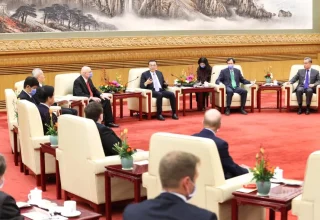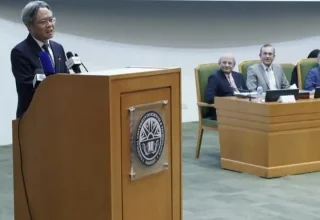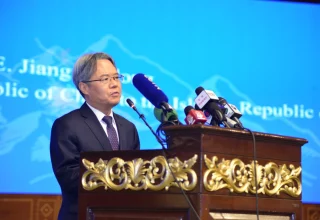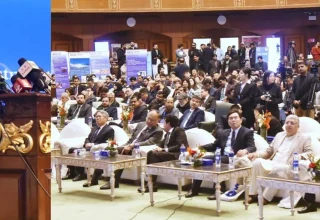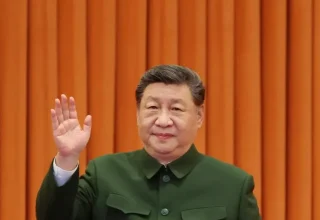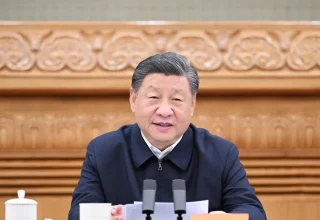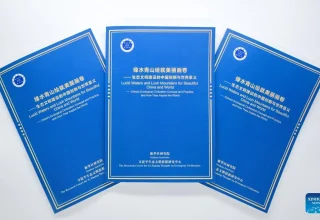
In recent years, the international community has faced growing ecological challenges ranging from climate change to biodiversity loss and environmental degradation. Amid these global concerns, China has not only rechartered its internal approach to ecological conservation but also offered a guiding philosophy for global sustainable development. A recent report highlights this vision and presents a comprehensive analysis of China’s ecological vision, practices and global relevance.
Titled “Lucid Waters and Lush Mountains for Beautiful China and World: China’s Ecological Civilization Concept and Practice, and How They Inspire the World,” the report was jointly released by the Xinhua Institute—a think tank affiliated with Xinhua News Agency—and the Research Center for Xi Jinping Thought on Ecological Civilization. It delves into the philosophical foundation, practical implementation and international significance of China’s ecological vision.
At the heart of the report lies the guiding principle: “Lucid waters and lush mountains are invaluable assets.” This idea is not merely a poetic phrase; it represents a strategic shift in how development and environmental protection are perceived not as opposing forces but as complementary elements of modern civilization.
According to the report, this concept has become the core philosophy of China’s ecological civilization. It stresses that the environment is not a cost to be paid for development but an integral part of sustainable economic and social progress. By placing ecology at the center of national planning, China has created a holistic framework that can inspire and influence international environmental governance.
One of the most significant aspects of this philosophy is that it goes beyond theory. China has turned this vision into reality through practical and scalable efforts. The report highlights numerous examples—ranging from afforestation and river rehabilitation projects to the promotion of renewable energy and the reduction of carbon emissions.
This philosophy has been deeply embedded in national policy and planning. Initiatives like the “Green Development” model and ecological red lines demonstrate China’s commitment to high-quality development that protects the natural world. As a result, China has made notable progress in areas such as improving air and water quality, expanding forest cover and investing in clean energy infrastructure.
Ren Weidong, Deputy Editor-in-Chief of Xinhua News Agency, stated during the symposium on the report that this ecological concept has evolved through continuous practice. It is a living idea—one that adapts and refines itself as it is applied across various landscapes and challenges.
Importantly, the report emphasizes the concept’s alignment with global green development goals, such as the United Nations Sustainable Development Goals (SDGs). It asserts that the principle of “lucid waters and lush mountains” resonates with global priorities like carbon neutrality, biodiversity conservation and clean energy transitions. China’s success provides a blueprint that other countries, especially developing nations can adapt to their own circumstances.
A key strength of the Chinese model, as highlighted in the report, is its ability to reconcile economic development with ecological protection. Rather than viewing environmental regulations as obstacles, China has embraced them as essential tools for achieving high-quality growth. This is a major shift from traditional development models, where environmental degradation was often an accepted side effect of industrial expansion.
The report states that China’s ecological approach is based on a deep understanding of natural laws and socio-economic dynamics. This insight enables policymakers to craft long-term strategies that balance immediate development needs with the imperatives of conservation.
Perhaps the most promising aspect of China’s ecological concept is its potential to inspire other nations, particularly those in the Global South. Many developing countries face the dual challenge of achieving rapid economic growth while preserving their natural environments. The Chinese model offers a way forward—one that does not force a choice between prosperity and sustainability.
The report suggests that this vision offers important ideological references and practical pathways for countries that are trying to leapfrog to modern, green economies. By sharing experiences, technology, and best practices, China contributes to global sustainable development as a coperative leader, not merely a participant.
Ren Weidong also emphasized the importance of international collaboration. China’s ecological civilization concept is not confined within national borders—it is a platform for shared learning and global engagement. Through multilateral forums, South-South cooperation and Belt and Road environmental initiatives, China is opening up avenues for joint action on climate and conservation.
This inclusive approach reflects a broader philosophical commitment to building a “community with a shared future for mankind,” where countries work together to address planetary challenges with shared responsibility and mutual benefit.
The report makes a compelling argument that China’s ecological strategy is not only about solving environmental problems—it is about redefining human progress. By placing ecological health at the heart of policy-making, China is forging a new path for civilization—one that values natural harmony as a foundation for lasting development.
This new path integrates production efficiency, environmental stability and social well-being, creating a vision for the future where economic strength and ecological sustainability go hand in hand.
The report, “Lucid Waters and Lush Mountains,” presents a powerful, practical and inspiring model for global ecological governance. Rooted in ancient Chinese wisdom but refined through modern practice, the concept provides a balanced and innovative approach to sustainable development.
In a world grappling with climate emergencies, resource depletion and ecological crises, China’s experience offers both hope and guidance. Its model shows that environmental protection and economic growth are not mutually exclusive—but rather, when carefully balanced, they are the key to building a more equitable, prosperous, and sustainable future for all.











